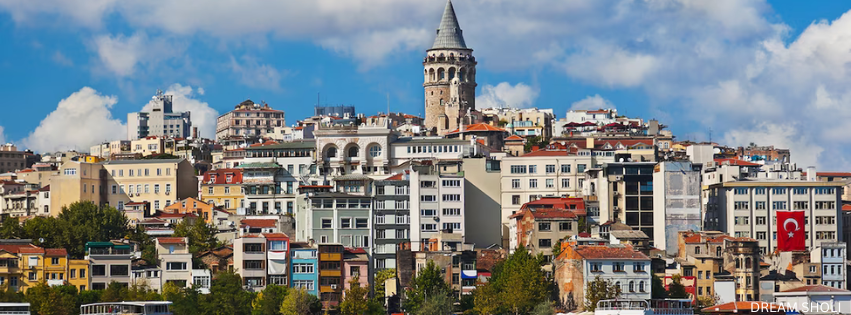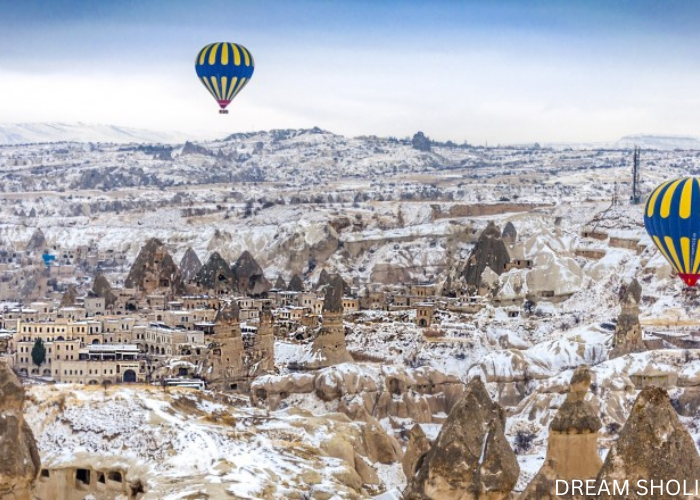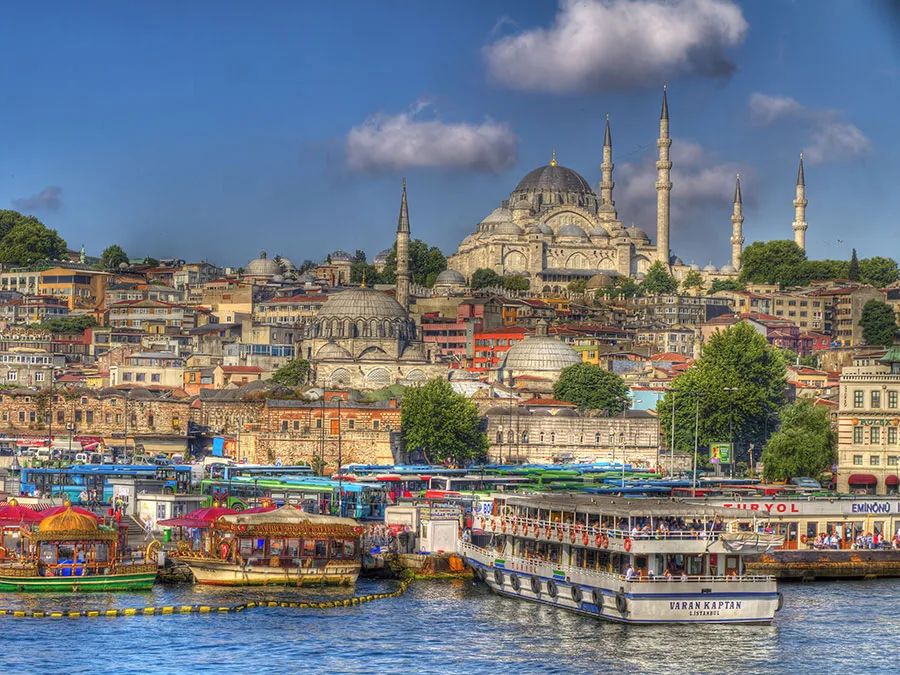
Turkey, a transcontinental nation straddling Eastern Europe and Western Asia, is renowned for its rich history, stunning landscapes, and vibrant culture. It serves as a bridge between East and West, with its unique blend of ancient traditions and modern influences. The country’s history is deeply intertwined with the rise and fall of empires, including the Byzantine and Ottoman empires, which have left a profound mark on its architecture, cuisine, and societal structures. Istanbul, the country’s largest city, is famous for its breathtaking skyline featuring iconic landmarks such as the Hagia Sophia, Topkapi Palace, and the Blue Mosque, which reflect Turkey’s diverse cultural heritage.
Beyond its historical treasures, Turkey boasts breathtaking natural wonders, including the fairy chimneys of Cappadocia, the stunning beaches along the Aegean and Mediterranean coasts, and the unique geological formations of Pamukkale. Turkish cuisine is another highlight, celebrated for its diverse flavors and regional specialties, with dishes such as kebabs, mezes, and baklava tantalizing the taste buds. The country is also known for its warm hospitality, where visitors are often welcomed with open arms. Festivals and cultural events throughout the year showcase the vibrant traditions, music, and arts that are integral to Turkish identity. Overall, Turkey offers a captivating blend of history, culture, and natural beauty, making it a fascinating destination for travelers.
Turkey experiences a diverse climate due to its unique geography, which encompasses coastal regions along the Mediterranean and Aegean seas, as well as mountainous areas in the interior. The country generally has four distinct seasons. Spring, from March to May, is typically mild and pleasant, with blooming flowers and moderate temperatures, making it an ideal time for outdoor activities and exploring historical sites, particularly in cities like Istanbul and Cappadocia. Summer, from June to August, can be hot, especially in inland and southeastern regions where temperatures often exceed 30°C (86°F), while coastal areas enjoy warm weather tempered by sea breezes, attracting many tourists to its beaches. Autumn, from September to November, brings a gradual cooling of temperatures and beautiful foliage, making it a popular time for exploration as the weather remains pleasant and crowds diminish. Winter, from December to February, can be quite cold, especially in eastern regions and mountainous areas, where snowfall is common and temperatures can drop below freezing. Coastal areas, however, typically experience milder winters, appealing to those seeking a temperate climate during this season. Overall, the best time to visit Turkey largely depends on the region and planned activities, with spring and autumn generally offering the most favourable weather conditions for enjoying the country’s rich cultural and natural heritage.

Turkish cuisine is a delightful fusion of flavors, textures, and aromas, reflecting the country’s diverse cultural heritage and history. Renowned for its use of fresh, high-quality ingredients, Turkish food emphasizes seasonal vegetables, aromatic herbs, and flavourful spices. The culinary landscape is characterized by a wide variety of dishes, from the iconic kebabs grilled meats marinated and cooked to perfection to mezes, a selection of small appetizers that often include hummus, dolmas (stuffed grape leaves), and baba ghanoush. One of the most beloved dishes is lahmacun, a thin flatbread topped with minced meat, vegetables, and spices, often enjoyed with a squeeze of lemon. Another staple is manti, Turkish dumplings filled with ground meat and served with a garlicky yogurt sauce and a drizzle of melted butter infused with paprika. Turkish tea and coffee play significant roles in the social fabric of the country, often served in traditional cups and accompanied by conversations among friends and family. With its rich culinary traditions and regional specialties, Turkish cuisine is a feast for the senses, inviting food lovers to explore its vibrant and diverse offerings.
The culture of Turkey is a captivating blend of ancient traditions and modern influences, reflecting its unique position as a bridge between East and West. Rich in history, Turkey boasts a heritage shaped by the legacies of various civilizations, including the Hittites, Byzantines, and Ottomans. This cultural tapestry is evident in the country’s art, music, dance, and architecture. Traditional Turkish music features a diverse range of styles, from folk songs accompanied by the haunting sounds of the saz to the intricate melodies of classical Ottoman music. Dance, particularly the energetic halay and the elegant whirling dervishes, showcases the vibrant spirit of Turkish celebrations. The architectural landscape is adorned with stunning examples of both ancient and modern design, with the majestic Hagia Sophia and Blue Mosque standing as testaments to the country’s rich religious and cultural history.


Istanbul, the largest city in Turkey, is a vibrant metropolis that serves as a major cultural, historical, and economic hub. Spanning both Europe and Asia across the Bosphorus Strait, it is the only city in the world that straddles two continents. Known for its rich history, Istanbul was formerly known as Byzantium and later Constantinople before adopting its current name. The city is a living testament to its diverse past, showcasing a blend of various cultures and civilizations, including the Roman, Byzantine, and Ottoman empires. The city’s skyline is dominated by iconic landmarks, such as the magnificent Hagia Sophia, a former cathedral turned mosque, and now a museum, which showcases stunning Byzantine architecture and mosaics. The Blue Mosque, with its striking blue tiles and elegant minarets, is another architectural marvel that attracts millions of visitors. The Topkapi Palace, once the residence of Ottoman sultans, now serves as a museum, offering insights into the opulence of the Ottoman Empire.
Istanbul is served by two major airports: Istanbul Airport (IST), which opened in 2018 and is among the largest and most modern airports globally, designed to handle a significant volume of passengers and flights. It serves as a major international gateway, connecting Istanbul to destinations worldwide. On the Asian side, Sabiha Gökçen International Airport (SAW) primarily caters to domestic flights and some international services, offering convenient access to the city for travelers.


Ankara is taKnown for its political significance, Ankara serves as the administrative center of Turkey, housing the nation’s government institutions, embassies, and foreign missions. Unlike Istanbul, which is famous for its historical landmarks, Ankara presents a more modern face, characterized by its wide boulevards, contemporary architecture, and green parks. Ankara is also known for its vibrant arts scene, featuring numerous theaters, galleries, and cultural festivals. The city hosts various events throughout the year, including the Ankara International Film Festival and the Ankara Music Festival, highlighting its commitment to arts and culture. One of the city’s most notable landmarks is Anıtkabir, the mausoleum of Mustafa Kemal Atatürk, the founder of the Republic of Turkey.
This grand structure, surrounded by beautifully landscaped gardens, serves as a site of national pride and is a must-visit for those exploring the city. Another significant cultural site is the Museum of Anatolian Civilizations, which showcases an extensive collection of artifacts that trace the rich history of the Anatolian region, including items from the Hittite, Phrygian, and Byzantine periods. Esenboga Airport (ESB) serves as the primary gateway to the capital, handling a significant number of domestic flights and some international services, connecting Ankara to various destinations. The airport has undergone modernization efforts to enhance passenger experience and expand its facilities, accommodating the increasing flow of travelers to and from the city.
he capital city of Turkey and holds significant political and cultural importance. Ankara serves as the political center of Turkey, housing the government institutions, foreign embassies, and the presidential complex. While not as famous as Istanbul, Ankara boasts historical sites such as the Anitkabir, the mausoleum of Mustafa Kemal Atatürk, the founder of modern Turkey. The city has a growing cultural scene with museums, art galleries, theaters, and music venues showcasing both traditional and contemporary Turkish culture. Ankara is home to several universities, making it a significant educational center in Turkey. Ankara’s main airport is Esenboga Airport, which connects the city to domestic and international destinations, facilitating travel in and out of the capital.
Antalya is a picturesque city located on the southwestern coast of Turkey, along the beautiful Mediterranean Sea. Antalya Airport (AYT) plays a crucial role in the city’s tourism infrastructure, being one of the busiest airports in Turkey. It serves a wide range of international flights, particularly during the peak summer months when tourists flock to the Mediterranean coast. The airport has been expanded and modernized to accommodate the increasing number of travelers and to enhance their experience, offering various amenities such as shopping, dining, and transportation options. Antalya is also famous for its breathtaking beaches, including Konyaaltı Beach and Lara Beach, both of which feature soft sands and clear turquoise waters. The city boasts numerous high-end resorts that offer luxurious amenities, water sports, and access to the beautiful coastline, making it a popular choice for holidaymakers. Antalya is a city that beautifully combines stunning natural landscapes with rich cultural heritage, making it a must-visit destination for travelers seeking both relaxation and exploration in Turkey.


The town is known for its charming whitewashed houses adorned with colorful bougainvillea, creating a postcard-perfect setting. The heart of Bodrum is its bustling marina, which is lined with an array of shops, cafes, and restaurants, offering both local and international cuisine. Visitors can enjoy a leisurely stroll along the waterfront, where luxury yachts and traditional gulets (wooden sailboats) dock, providing opportunities for boat trips and excursions to explore nearby coves and islands.
Milas-Bodrum Airport (BJV) serves as the primary gateway to Bodrum and the surrounding areas, facilitating travel for tourists from around the world. The airport is well-connected, offering numerous international flights, especially during the summer season when tourism peaks. With modern facilities and a variety of services, including car rentals and transportation options, the airport ensures a smooth arrival and departure experience for travelers.
With its stunning landscapes, historical significance, and lively atmosphere, Bodrum offers a perfect blend of relaxation and adventure, making it a sought-after destination for those looking to experience the best of Turkey’s Aegean coast.

Explore the world effortlessly with our tailored travel packages. Let us handle the details while you create unforgettable memories.
Copyright 2024 Dream Sholi